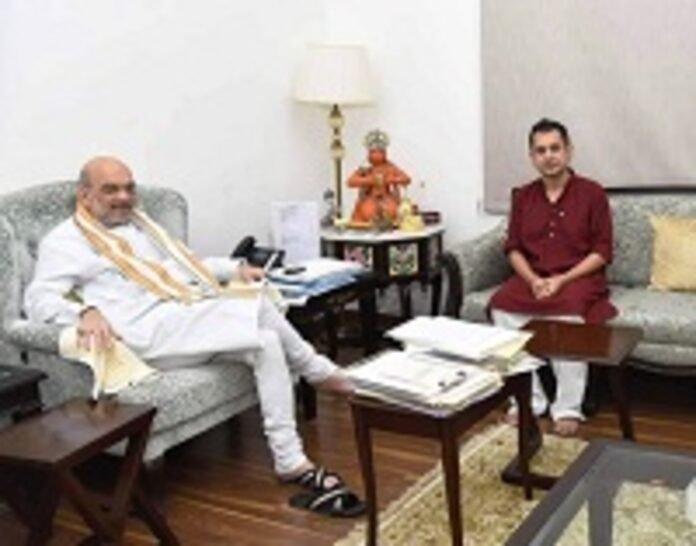In the realm of Indian politics, clandestine meetings and undisclosed discussions often set the stage for speculations and debates that ripple across the socio-political landscape. The recent meeting between Pradyot Bikram, the former chairman of Tipra Motha, and Union Home Minister Amit Shah has added another layer of intrigue to the ongoing political narrative. The context of this meeting, its implications, and the subsequent reactions from both sides have given rise to a plethora of conjectures, leaving observers and citizens alike curious about the hidden motives behind closed doors.
The Ambiguous Encounter: Amidst By-Elections and Political Maneuvering
The timing of the meeting is noteworthy, as it occurred on the eve of the by-elections in the Baxnagar and Dhanpur Assembly constituencies. These elections, scheduled for September 5, 2023, hold significance not only for the constituencies themselves but also for the broader political landscape of the region. What adds to the enigma is the lack of transparency from both Amit Shah and Pradyot Bikram regarding the purpose of their interaction. The absence of a clear statement from either side has fueled a whirlwind of assumptions and theories among political analysts and the general public.
Interestingly, while Pradyot Bikram refrained from sharing any visual evidence of the meeting on his social media platforms, a photograph of the encounter surfaced on the Facebook page of BJP spokesperson Sambit Patra. This development further escalated the curiosity, prompting questions about the motivations behind making the photograph public and the role it plays in the broader political narrative.
Pradyot Bikram’s Cryptic Facebook Post: A Glimpse into His Perspective
While the meeting remained shrouded in secrecy, Pradyot Bikram did share his thoughts on Facebook shortly afterward. In his post, he emphasized the significance of securing the rights of the Tiprasa people rather than aligning with political parties that have allegedly denied them their fundamental rights. He highlighted the importance of engaging with entities that assure the delivery of constitutional rights, regardless of ideological labels. Pradyot Bikram’s assertion that ideological positions have hindered the development and economic progress of the community raises questions about his intended role in the larger political discourse.
Reading Between the Lines: Possible Implications
As political pundits analyze the events surrounding this meeting, several potential implications come to the forefront. The decision of Tipra Motha, under Pradyot Bikram’s leadership, to refrain from fielding candidates in the Baxnagar and Dhanpur by-elections raises eyebrows. Their reason, reportedly to prevent vote-splitting that could potentially weaken their stance against the BJP, offers a glimpse into their strategic maneuvering.
Pradyot Bikram’s meeting with Amit Shah adds another layer of complexity to the scenario. The speculation that the BJP seeks support from Tipra Motha in the upcoming by-elections indicates a potential alignment between the two entities. The meeting, albeit undisclosed in purpose, could hint at a larger understanding or collaboration on specific issues that hold importance for both parties.
The Broader Socio-Political Context: Regional Dynamics and National Politics
To understand the implications of such encounters, one must delve into the intricate interplay between regional dynamics and national politics. The North-Eastern region of India has often witnessed a unique blend of local concerns and national agendas. The region’s history, cultural diversity, and socio-economic challenges create a complex tapestry of aspirations and affiliations.
Pradyot Bikram’s emphasis on constitutional rights and development resonates with the broader narrative of empowerment and progress. Aligning with a political entity that promises to address these concerns could signify a calculated move to secure a better future for the community he represents.
Decoding the Puzzle
As the by-elections of Baxnagar and Dhanpur Assembly constituencies draw nearer, the political landscape remains alive with speculation and conjecture. Pradyot Bikram’s enigmatic meeting with Union Home Minister Amit Shah adds a layer of complexity to the unfolding narrative. While the intentions and implications remain shrouded in mystery, one thing is certain—the meeting has set the stage for a captivating political drama that could shape the future of the region.
As the citizens of India’s North-Eastern states eagerly await the outcome of the by-elections, they are reminded that politics, like any intricate puzzle, requires careful examination of each piece to decipher the larger picture. The meeting between Pradyot Bikram and Amit Shah is but one piece of this puzzle, and only time will reveal its true significance in the intricate dance of power and governance.


